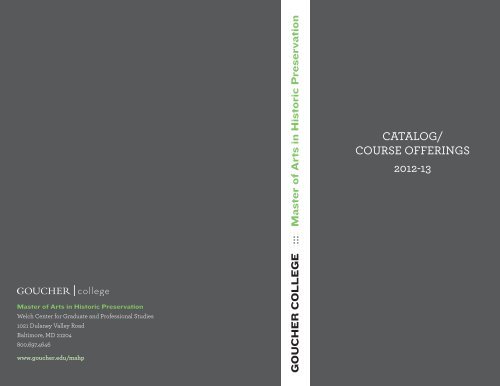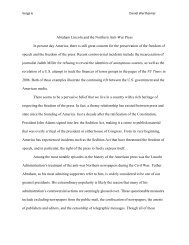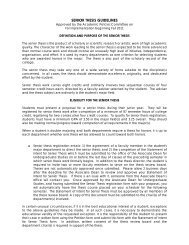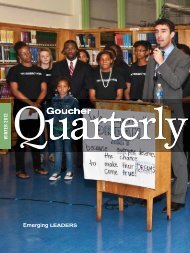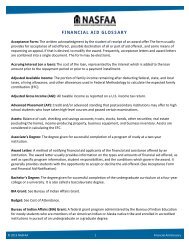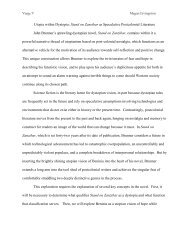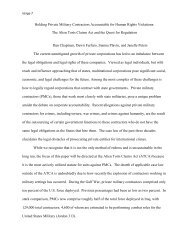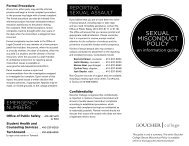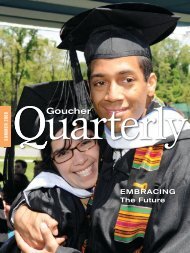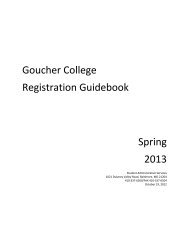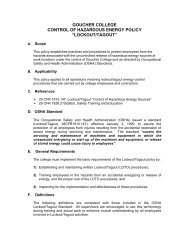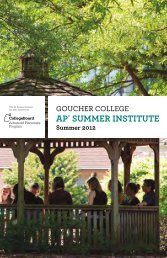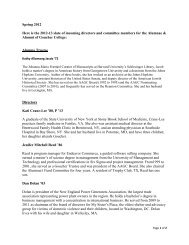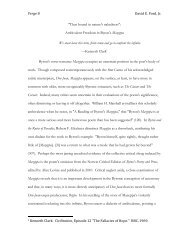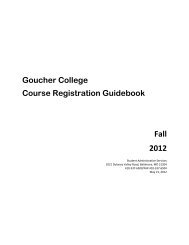Course Catalogue 2012-13 - Goucher College
Course Catalogue 2012-13 - Goucher College
Course Catalogue 2012-13 - Goucher College
Create successful ePaper yourself
Turn your PDF publications into a flip-book with our unique Google optimized e-Paper software.
Master of Arts in Historic Preservation<br />
Welch Center for Graduate and Professional Studies<br />
1021 Dulaney Valley Road<br />
Baltimore, MD 21204<br />
800.697.4646<br />
www.goucher.edu/mahp<br />
GOUCHER COLLEGE ::: Master of Arts in Historic Preservation<br />
CATALOG/<br />
COURSE OFFERINGS<br />
<strong>2012</strong>-<strong>13</strong>
Important Dates<br />
<strong>2012</strong>-<strong>13</strong> | Academic Year<br />
February 17, <strong>2012</strong> Deadline for applications for <strong>2012</strong>-<strong>13</strong><br />
academic year<br />
March 12, <strong>2012</strong><br />
April 2, <strong>2012</strong><br />
July 27, <strong>2012</strong><br />
July 29, <strong>2012</strong><br />
July 30, <strong>2012</strong><br />
Decision letters mailed<br />
Enrollment Agreement and deposit due<br />
Fall semester tuition due<br />
Students arrive on campus<br />
Campus residency portion of<br />
Fall semester begins<br />
Table of Contents<br />
Master of Arts in Historic Preservation Program<br />
On-Campus Residency Requirements . . . . . . . . . . . . . . . . . . . . . . . . . . . 2<br />
Off-Campus Requirements . . . . . . . . . . . . . . . . . . . . . . . . . . . . . . . . . . . . . 3<br />
Tuition and Fees . . . . . . . . . . . . . . . . . . . . . . . . . . . . . . . . . . . . . . . . . . . . . . . 3<br />
Prizes and Awards . . . . . . . . . . . . . . . . . . . . . . . . . . . . . . . . . . . . . . . . . . . . . 3<br />
Financial Aid . . . . . . . . . . . . . . . . . . . . . . . . . . . . . . . . . . . . . . . . . . . . . . . . . . . 4<br />
How to Apply . . . . . . . . . . . . . . . . . . . . . . . . . . . . . . . . . . . . . . . . . . . . . . . . . . 5<br />
Curriculum<br />
Transfer Credits . . . . . . . . . . . . . . . . . . . . . . . . . . . . . . . . . . . . . . . . . . . . . . . . 6<br />
Required <strong>Course</strong>s . . . . . . . . . . . . . . . . . . . . . . . . . . . . . . . . . . . . . . . . . . . . . . 6<br />
Electives . . . . . . . . . . . . . . . . . . . . . . . . . . . . . . . . . . . . . . . . . . . . . . . . . . . . . . . 8<br />
August 5, <strong>2012</strong><br />
Graduate Programs Commencement<br />
General Academic Information<br />
August 11, <strong>2012</strong> Campus residency ends<br />
December 7, <strong>2012</strong> Fall semester ends<br />
The following dates have not been finalized:<br />
January 4, 20<strong>13</strong> Spring semester tuition and fees due<br />
January 14, 20<strong>13</strong> Spring semester begins<br />
April 26, 20<strong>13</strong> Spring semester ends<br />
Add/Drop Policy . . . . . . . . . . . . . . . . . . . . . . . . . . . . . . . . . . . . . . . . . . . . . . 10<br />
Leave of Absence . . . . . . . . . . . . . . . . . . . . . . . . . . . . . . . . . . . . . . . . . . . . 10<br />
<strong>Course</strong> Extension . . . . . . . . . . . . . . . . . . . . . . . . . . . . . . . . . . . . . . . . . . . . . 10<br />
Grading System . . . . . . . . . . . . . . . . . . . . . . . . . . . . . . . . . . . . . . . . . . . . . . 10<br />
<strong>Course</strong> and Research Materials . . . . . . . . . . . . . . . . . . . . . . . . . . . . . . . 11<br />
Refund Policy . . . . . . . . . . . . . . . . . . . . . . . . . . . . . . . . . . . . . . . . . . . . . . . . 11<br />
Faculty . . . . . . . . . . . . . . . . . . . . . . . . . . . . . . . . . . . . . . . . . . . . . . . . . . . . . . . . . . . . .12<br />
::: 1 :::
Master of Arts in<br />
Historic Preservation<br />
<strong>Goucher</strong>’s Master of Arts in Historic Preservation (MAHP) program reflects<br />
the breadth of historic preservation. Founded in 1995 as the nation’s first<br />
limited-residency graduate program in the field, the MAHP program is geared<br />
toward long-time preservationists who wish to add to their knowledge, professionals<br />
in related fields who seek to specialize in historic preservation, as well<br />
as individuals who wish to change careers. Specifically designed for students<br />
who cannot, for family or work-related reasons, attend traditional on-campus<br />
programs, MAHP courses are conducted electronically and by telecommunication<br />
during fall and spring semesters. On-campus residency requirements<br />
are limited to two-week summer sessions.<br />
The program consists of required and elective courses, including a thesis.<br />
During the first summer residency, students develop an individual course<br />
of study tailored to their interests. To accommodate work-related and family<br />
obligations, students may elect to complete the program in as few as two<br />
years or as many as five.<br />
The faculty for the program is drawn from the nation’s leading historic preservation<br />
practitioners and academics. Serving as tutors and mentors rather<br />
than traditional lecturers, faculty members meet with students during the<br />
on-campus summer residencies and maintains close contact throughout the<br />
off-campus semesters, providing students with a depth of experience as well<br />
as academic rigor.<br />
On-Campus Residency Requirements<br />
Students accepted into the program will be required to attend on-campus<br />
residencies each summer. Students attend the entire two-week session during<br />
their first year. The on-campus time for returning students is usually five to<br />
seven days. During the first summer, new students will meet with the program<br />
director to create their individual course of study—their guide to completing<br />
the program. New students will also attend on-campus portions of required<br />
courses such as Introduction to Historic Preservation, American Architecture<br />
or Urban History, and all other courses they plan to take during the following<br />
fall and spring semesters.<br />
During subsequent summer residencies, students will meet with the program<br />
director to refine their course of study and with the thesis director to develop<br />
their thesis topic. Returning students will also participate in the on-campus<br />
portions of required and elective courses that they will be taking during the<br />
subsequent academic year.<br />
Off-Campus Requirements<br />
Although some courses have one- to seven-day class sessions on campus, the<br />
majority are only introduced during one-and-one-half to three-hour sessions.<br />
<strong>Course</strong>s are designed to be completed off campus during the 14-week fall or<br />
spring semesters. Students are expected to spend approximately 10 to 12<br />
hours per week on each course.<br />
Faculty maintain regular contact with students throughout the semester.<br />
Depending on the course, this may involve individual telephone discussions,<br />
conference calls, online synchronous discussions, or asynchronous conversations.<br />
Typically, faculty and students communicate every two weeks.<br />
Tuition and Fees<br />
For the 2011 entering class, tuition was $720 per credit. There is an $90<br />
student services fee each semester. Students should budget approximately<br />
$150 per course for texts, readings, and other materials.<br />
On-campus room and board for the 2011 summer session was $80 per night.<br />
Students will be housed in individual air-conditioned dorm rooms with meals<br />
provided in the dining hall. Although it is highly recommended that students<br />
reside on campus, they may elect to reside off campus during the summer session.<br />
Those doing so must make their own housing and dining arrangements.<br />
Modest annual increases in tuition and fees may be expected.<br />
Prizes and Awards<br />
The following prizes and awards are available for students enrolled in the<br />
MAHP program.<br />
Alumnae/i Prize<br />
The Master of Arts in Historic Preservation Alumnae/i Prize was established<br />
in 2002 by the first two graduates of the MAHP program in order to encourage<br />
and reward an outstanding first year historic preservation graduate student.<br />
It is given each year for the best term paper in Introduction to Historic<br />
Preservation. The Alumnae/i Prize for 2011 was $1,000.<br />
Lee Prize<br />
The Stephen K.F. and Katharine W. Lee Prize was established in 1999 by<br />
Antoinette J. Lee in honor of her parents. It is given each year for the best<br />
paper or project that addresses the preservation of America’s diverse heritage,<br />
including cultural and ethnic groups, lifestyle diversity, and the cultural imprint<br />
of other defined groups on American society. The Lee Prize for 2011<br />
was $3,000.<br />
::: 2 ::: ::: 3 :::
McCullough Award<br />
The Hiram McCullough Award in Historic Preservation was established in<br />
1995 by Anne McCullough Pettit in memory of her father, Hiram McCullough<br />
(1905-1982), and their distinguished ancestor, the Hon. Hiram McCullough<br />
(18<strong>13</strong>-1885). It is given each year for the best thesis. The McCullough Award<br />
for 2011 was $4,000.<br />
Financial Aid<br />
MAHP students may apply for a Federal Direct Stafford or Direct Graduate<br />
PLUS Loan. Eligibility for federal direct loans is based on need, as determined<br />
by the Free Application for Federal Student Aid (FAFSA). Students<br />
receiving these loans are required to take a minimum of 4.5 credits per<br />
semester. To determine eligibility for these loans, please complete the FAFSA<br />
at www.fafsa.gov. Some applicants will be required to submit additional information.<br />
We encourage all students to use the Financial Aid Student Tracking<br />
System (FASTS) to learn the status of their financial aid file. For more information,<br />
visit www.goucher.edu/gradaid.<br />
<strong>Goucher</strong> <strong>College</strong> is authorized to provide for the education of qualified veterans<br />
and when eligible, the spouses and children of deceased or disabled veterans<br />
under the provision of the various federal laws pertaining to veterans’<br />
educational benefits. Students eligible for veterans’ benefits must apply for<br />
admission, pay their bills, and register in the same manner as non-veteran<br />
students. Reimbursement is made by the Department of Veterans’ Affairs.<br />
To receive benefits, students must qualify for benefits and must comply with<br />
the rules that have been established by the Department of Veterans’ Affairs<br />
and the policies currently in effect at <strong>Goucher</strong>. Further information and enrollment<br />
forms may be obtained from <strong>Goucher</strong>’s Office of Student Administrative<br />
Services, (410) 337-6500.<br />
Students should also check with their employers regarding possible financial<br />
assistance.<br />
Please note that the cost of on-campus residency room and board is not<br />
covered by financial aid and that international students are not eligible for<br />
financial aid. The fall semester begins on the first day of the on-campus<br />
residency and continues through the end of the off-campus portion.<br />
A limited number of scholarships are available. A FAFSA must be completed<br />
as part of the eligibility requirements.<br />
How to Apply<br />
To be considered for admission, an applicant must submit the following by<br />
February 17, <strong>2012</strong>:<br />
• A completed application form, including three copies of the essay and a<br />
nonrefundable $50 application fee made payable to <strong>Goucher</strong> <strong>College</strong>.<br />
The application form and other information may be obtained by contacting<br />
the Welch Center for Graduate and Professional Studies at<br />
<strong>Goucher</strong> <strong>College</strong> at 800-697-4646.<br />
• Official transcripts of all undergraduate and graduate work sent<br />
directly by the college(s) or university(s) to the address below or by<br />
including official transcripts in the institution’s sealed envelope with<br />
your application.<br />
• Three letters of recommendation from people who know you well<br />
enough to give an informed opinion of your intellectual ability, capacity<br />
for sustained self-directed study and personal qualifications.<br />
ALL APPLICATION MATERIALS SHOULD BE FORWARDED TO:<br />
Master of Arts in Historic Preservation<br />
Welch Center for Graduate and Professional Studies<br />
<strong>Goucher</strong> <strong>College</strong><br />
1021 Dulaney Valley Road<br />
Baltimore, Maryland 21204-2794<br />
The financial aid application form (if applicable) should be sent directly to<br />
Student Administrative Services, Office of Student Financial Aid, <strong>Goucher</strong><br />
<strong>College</strong> (See Financial Aid).<br />
Acceptance to the program will be based on evaluation of applicant’s work<br />
experience, paid or volunteer; essay; letters of recommendation; and college<br />
or university transcripts. GRE scores are optional. The essay is most important,<br />
as it demonstrates the applicant’s ability to undertake self-directed<br />
graduate study.<br />
Acceptance letters will be mailed on March 12, <strong>2012</strong>. Accepted students are<br />
required to submit the enrollment agreement, along with a non-refundable<br />
$500 deposit, by April 2, <strong>2012</strong>. This deposit will be credited towards tuition<br />
charges for the following semester.<br />
As a result of Department of Education policies, <strong>Goucher</strong> may not be able to<br />
accept students from a few states. For more information about regulations<br />
governing the provision of distance education and <strong>Goucher</strong>’s compliance with<br />
those regulations, please visit www.goucher.edu/doe.<br />
::: 4 ::: ::: 5 :::
Curriculum<br />
The Master of Arts in Historic Preservation program at <strong>Goucher</strong> <strong>College</strong> allows<br />
students, in consultation with the director, to tailor an individual program<br />
of study within a diverse selection of course offerings. Students must<br />
take eight required courses that provide the foundation for the individual<br />
focus, as well as complete a thesis. Students may select from eight elective<br />
courses or propose their own independent study course.<br />
All entering students must take HP 601–Introduction to Historic Preservation<br />
in their first year. While it is recommended that all required courses are completed<br />
before taking electives, it is not required. A total of 38 credits is required<br />
for graduation. Students must take at least one course per semester to<br />
remain in the program. A maximum of three courses per semester is allowed.<br />
Students have a maximum of five years to complete all program requirements.<br />
Transfer Credits<br />
Incoming students may apply to transfer up to seven credits from approved<br />
graduate-level historic preservation or related courses successfully completed<br />
at accredited colleges or universities. The course content must be similar to<br />
that offered by the Master of Arts in Historic Preservation program. Credit<br />
may not be transferred for HP 638 or 641.<br />
Students seeking transfer credits must submit a photocopy of course syllabus,<br />
catalogue description and other material that adequately describes the course<br />
to the director by the first day of the summer session. A transfer fee of $90 will<br />
be charged for each credit approved.<br />
Required <strong>Course</strong>s<br />
HP 601.<br />
HP 610.<br />
Introduction to Historic Preservation<br />
GORDON, JUDD, MILLER, TILLER, WAGNER 4 CREDITS/FALL<br />
Introduction to the history, theory, and practice of historic<br />
preservation in the United States from the 19th century to<br />
the present.<br />
American Architecture<br />
DRELLER, GYURE<br />
3 CREDITS/FALL<br />
Development of American buildings from the colonial period to<br />
the present with emphasis on construction materials and technologies<br />
that have shaped their appearance.<br />
HP 6<strong>13</strong>.<br />
HP 630.<br />
HP 631.<br />
HP 638.<br />
HP 641.<br />
Urban History<br />
MECK<br />
3 CREDITS/SPRING<br />
Development of the American city from colonial times to the<br />
present, with emphasis on political, social, and economic factors<br />
affecting urban and regional form and patterns.<br />
Perspectives in Preservation<br />
BERG, BOASBERG, KEUNE, MILLER, SAMFORD, WILSON ADEN<br />
3 CREDITS/FALL<br />
Introduction to archaeology, cultural landscapes, preservation<br />
law, public relations for preservation, international preservation<br />
and current topics in historic preservation.<br />
Historic Property Documentation<br />
BRADLEY, BUSHONG<br />
3 CREDITS/SPRING<br />
Documentation techniques for cultural heritage including research<br />
methods, preparation of narrative descriptions and statements of<br />
significance, and on-site investigations and evaluation.<br />
Thesis Proposal<br />
BRADLEY, GYURE, MILLER<br />
2 CREDITS/FALL AND SPRING<br />
Proposal of the topic, content and focus of the thesis, including<br />
literature research and proposed committee members.<br />
Thesis<br />
BRADLEY, GYURE, MILLER<br />
5 CREDITS/FALL AND SPRING<br />
The thesis is the culmination of the program of study and incorporates<br />
a stated hypothesis to examine a preservation issue germane<br />
to the student’s interest. Students will also have the<br />
opportunity of selecting additional faculty for HP 641–Thesis<br />
with the approval of the thesis director. The thesis committee will<br />
examine the written thesis and hear an oral defense. Prerequisite:<br />
HP 638–Thesis Proposal.<br />
::: 6 ::: ::: 7 :::
ELECTIVES<br />
HP 620.<br />
HP 621.<br />
Historic Preservation as Public Policy<br />
TILLER<br />
3 CREDITS/SPRING<br />
Critical analysis of historic preservation as public policy at the<br />
national, state, and local levels, with attention to factors that contribute<br />
to creating and shaping policies and their administration.<br />
Organizational Development for Preservation Nonprofits<br />
CORT<br />
3 CREDITS/SPRING<br />
Theory and practices leading to effective nonprofit preservation<br />
organizations. Examination of governance and planning, board<br />
and staff development, fundraising, advocacy, and public relations,<br />
as well as the nonprofit sector’s role in the preservation movement.<br />
HP 629.<br />
HP 634.<br />
Preservation and Sustainability<br />
MILLER, TILLER, WAGNER<br />
3 CREDITS/SPRING<br />
Examination of environmental and economic issues of sustainability<br />
and their effect on historic preservation principles and<br />
practices.<br />
Preservation Technology<br />
GREEN<br />
3 CREDITS/FALL<br />
The properties of building materials, the mechanism of deterioration<br />
and diagnostic methods, including examining and<br />
evaluating historic fabric, sustainability issues, and the whole<br />
building’s performance as a system is emphasized as the basis<br />
for recommendation of appropriate conservation or restoration<br />
treatments.<br />
HP 622.<br />
HP 623.<br />
HP 628.<br />
Preservation Planning<br />
GORDON<br />
3 CREDITS/SPRING<br />
Exploration of preservation planning at the federal, state, and<br />
local levels, with emphasis on the relationship between documenting<br />
the historic environment and community planning<br />
and on development and the use of local planning techniques<br />
to further historic preservation.<br />
Preservation Economics<br />
SMITH<br />
3 CREDITS/FALL<br />
Exploration of the economics of preservation, including real<br />
estate development basics for historic buildings, financial<br />
incentives to support preservation, and the economic impact<br />
of preservation programs and activities on the national, state,<br />
and local levels.<br />
Independent Study<br />
WAGNER<br />
3 CREDITS/FALL AND SPRING<br />
Students develop the topic and focus of their own course in any<br />
area of historic preservation with the assistance of the program<br />
director. The faculty member is drawn from experts in the area<br />
selected. The course syllabus is written by the student during<br />
the semester prior to the one in which HP 628–Independent<br />
Study is taken.<br />
::: 8 ::: ::: 9 :::
General Academic Information<br />
Add/Drop Policy<br />
No student may add a course after the first day of the semester. The last day a<br />
student may drop a semester course without a withdrawal appearing on the<br />
academic record is the Friday after the residency concludes for the fall term<br />
and the second Friday after the start of the spring term. Students withdrawing<br />
after this period will receive a W on their permanent record.<br />
Leave of Absence<br />
Students must enroll in a minimum of one course per semester to remain<br />
active on the rolls of the college. Students in good academic and financial<br />
standing may request a leave of absence for no more than two semesters during<br />
the total degree candidacy. They are expected to return to the college at<br />
the conclusion of their leave. Students must apply in writing to the director<br />
for a leave of absence.<br />
<strong>Course</strong> Extension<br />
<strong>Course</strong>s are designed to be completed in the 14- to 15-week semesters. Students<br />
unable to complete a course within that time must apply in writing to<br />
the director for an extension by week 12 of the semester. Extensions in all<br />
courses except for HP 641–Thesis may be granted for one semester only.<br />
For the 2011-12 academic year, a fee of $350 per credit for an official extension<br />
will be charged. Up to two extensions, may be granted for HP 641–Thesis.<br />
Modest annual increases may be expected.<br />
Grading System<br />
All courses except HP 638–Thesis Proposal and HP 641–Thesis, which are<br />
graded P (pass), or NP (no pass), will use the following grading system: A, B,<br />
C, F, EX (extension), or W (withdraw). The letter grades B and C may be modified<br />
by plus (+) and grades A through C by minus (-).<br />
As part of the continued guidance offered to each student, the program director<br />
evaluates the record of any student who receives a course grade of C+ or<br />
less or whose grade point average falls below a 3.0. On the basis of this evaluation,<br />
the student may be placed on probation for one semester, or dismissed<br />
from the college.<br />
Detailed information on policies and procedures is contained in theWelch<br />
Center for Graduate and Professional Studies Graduate Student Handbook.<br />
<strong>Course</strong> and Research Materials<br />
Most course texts, readings, and other materials are available from a national<br />
distribution house associated with the college. Additional course material is<br />
available during the summer session. Students are responsible for securing<br />
all research and other materials necessary for courses. Minimum computer<br />
requirements are:<br />
Computer Requirements<br />
• Windows XP or later, or Mac OS 10.4 or later<br />
• Minimum 2GB of memory (RAM)<br />
• The latest version of Java available from www.java.com<br />
• The latest version of QuickTime available from www.apple.com/quicktime<br />
• Current word processing software<br />
• Headset with microphone<br />
Internet Access<br />
• Broadband Internet connection such as DSL or Cable modem<br />
• Use of <strong>Goucher</strong> e-mail<br />
Refund Policy<br />
You will receive a refund of your tuition based on when you withdraw<br />
from a course<br />
A partial refund of payments may be made to students who withdraw from<br />
courses of their own accord. Any credit balance remaining after these adjustments<br />
to the student’s account will be refunded. Institutional and federal aid<br />
as well as tuition and fees will be adjusted in accordance with the Federal Return<br />
of Title IV calculation. The Title IV calculation is based on the day of attendance<br />
as a percentage of total days in the semester up until 60%. For example,<br />
if a student drops a class after completing 20% of the semester, the student<br />
would be eligible for a refund of all but 20% of the tuition (or an 80% refund).<br />
After 60% of the semester has been completed, no refunds are awarded.<br />
Refund/Credit Allowed<br />
Before classes begin<br />
Up until 60% of the semester<br />
After 60% of the semester<br />
100% refund<br />
Prorated refund based on Title IV refund policy<br />
No refund<br />
::: 10 ::: ::: 11 :::
Faculty<br />
PATRICIA WILSON ADEN<br />
Adjunct instructor, Wilmington, Delaware; vice president of operations, African American<br />
Museum of Philadelphia; former vice president for Arts, Culture and Entertainment of<br />
Universal Companies and former director of the Mid-Atlantic Regional Office of the National<br />
Trust for Historic Preservation; B.A., Spelman <strong>College</strong>; M.A., Cornell University<br />
SHARY PAGE BERG, FASLA<br />
Adjunct assistant professor, Cambridge, Massachusetts; consultant; B.A., University of<br />
Pennsylvania; M.L.A., Harvard University<br />
TERSH BOASBERG<br />
Adjunct assistant professor, Washington D.C.; attorney in private practice; adjunct professor<br />
of Law, Georgetown University Law Center; chair, District of Columbia Historic Preservation<br />
Review Board; former chair, District of Columbia zoning commission; founder and former<br />
president, National Center for Preservation Law; founder and former general counsel,<br />
Preservation Action; former trustee, National Building Museum; B.A., Yale University; J.D.,<br />
Harvard University<br />
BETSY H. BRADLEY<br />
Thesis director and adjunct assistant professor, Taylors Falls, Minnesota; consultant; B.A.,<br />
Iowa State University; M.A., Columbia University; Ph.D., Case Western Reserve University<br />
WILLIAM BUSHONG<br />
Adjunct assistant professor, Columbia, Maryland; historian and website manager, White<br />
House Historical Association; B.A., North Carolina State University; M.A., Appalachian State<br />
University; Ph.D., The George Washington University<br />
LISBETH HENNING CORT<br />
Adjunct assistant professor. Coupeville, Washington; principal, Cort Communications; B.A.,<br />
Tennessee Technological University; M.S., Ball State University<br />
SARAH M. DRELLER<br />
Adjunct assistant professor, Chicago, Illinois; adjunct instructor, Columbia <strong>College</strong> of Art,<br />
Chicago, Illinois; B.A., Florida State University; M.Arch.H., University of Virginia; Ph.D.<br />
candidate, University of Illinois at Chicago<br />
KAREN GORDON<br />
Adjunct assistant professor, Seattle, Washington; historic preservation officer, City of<br />
Seattle, Seattle, Washington; B.A., M.U.R.P., The George Washington University<br />
MELVYN GREEN, FASCE<br />
Adjunct professor, Torrance, California; president, Melvyn Green & Associates; past member<br />
of the Board of International Code Council, Earthquake Engineering Research Institute; past<br />
president, Structural Engineering Association of California; lecturer, Historic Preservation<br />
Program, University of Southern California; B.S., University of Arizona<br />
DALE ALLEN GYURE<br />
Thesis director and adjunct associate professor, Farmington Hills, Michigan; associate<br />
professor, Lawrence Technological University; B.S., Ball State University; J.D., Indiana<br />
University; M.Arch.H., University of Virginia; Ph.D., University of Virginia<br />
BRUCE D. JUDD, FAIA<br />
Adjunct assistant professor, Seaside, Florida; principal, Bruce Judd Consulting Group;<br />
consulting principal, Architectural Resources Group, Inc.; past expert member, Advisory<br />
Council on Historic Preservation; past member, Committee on Preservation and Security<br />
for the White House and the Capitol; past member, Board of Trustees of the National Trust<br />
for Historic Preservation; past member, Board of Directors of Preservation Action; and past<br />
member, Board of Trustees of the California Preservation Foundation.<br />
RUSSELL V. KEUNE, FAIA<br />
Adjunct assistant professor, Arlington, Virginia; consultant; former senior vice president,<br />
National Trust for Historic Preservation; former vice president for programs, US/ICOMOS;<br />
former director of international relations, American Institute of Architects; B.Arch., M.Arch.,<br />
University of Illinois<br />
STUART MECK, FAICP<br />
Adjunct assistant professor, Trenton, New Jersey; faculty fellow and director, Center for<br />
Government Services, E.J. Bloustein School of Planning and Public Policy, Rutgers University;<br />
B.A., M.A., M.C.P., Ohio State University; M.B.A.,Wright State University<br />
HUGH C. MILLER, FAIA<br />
Thesis director and adjunct professor, Richmond, Virginia; former director, Virginia Department<br />
of Historic Resources and State Historic Preservation Office; former chief historical<br />
architect, National Park Service; founder and past president, Association for Preservation<br />
Technology Foundation; B.Arch., University of Pennsylvania<br />
PATRICIA SAMFORD<br />
Adjunct instructor, St. Leonard, Maryland; director, Maryland Archaeological Conservation<br />
Laboratory; B.A. and M. A. <strong>College</strong> of William and Mary; Ph.D., University of North Carolina.<br />
KENNEDY SMITH<br />
Adjunct assistant professor, Arlington, Virginia; principal, CLUE Group, LLC; former director,<br />
National Trust Main Street Center; B.A., Bryn Mawr <strong>College</strong>; Loeb Fellow, Harvard University<br />
Graduate School of Design<br />
DE TEEL PATTERSON TILLER<br />
Adjunct professor, Fairfax, Virginia; deputy associate director, Cultural Resources, National<br />
Park Service (retired); B.A., M.Arch.H., University of Virginia; D.H.L., <strong>Goucher</strong> <strong>College</strong><br />
RICHARD D. WAGNER, AIA<br />
Director and adjunct professor, Baltimore, Maryland; principal, David H. Gleason Associates,<br />
Inc. Architects; associate professorial lecturer in historic preservation, The GeorgeWashington<br />
University; B.Arch., University of Virginia; Ph.D., University of Edinburgh<br />
::: 12 ::: ::: <strong>13</strong> :::<br />
C12068A-08/11


